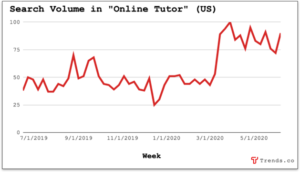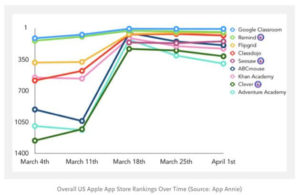Hello AAR Agency Growth Program Partner,
AAR Partners has joined forces with Catapult and Winmo to help provide leads for new business opportunities based on the right timing.
But this time, we’ve put science behind the art of prospecting by using data from technologies like Winmo, Pathmatics, and Bombora. This powerful combination helps increase the probability of reaching out at the right time to engage and eventually convert.
This month our research showed a surge of interest around “Media Agencies” and “Media Planning” within the QSR and Retail sectors.
While there are a host of brands/companies looking for media help, we have isolated two opportunities, for our AAR Agency Growth Program Partners to evaluate, who may be in need of some media services help right now.
Founded in 2004, Shake Shack is based out of New York. It is known for its natural hamburgers, hotdogs, and milkshakes. Historically, this is a brand that has not had to put a lot of dollars into large media campaigns, but in the time of Covid, it’s no surprise to see the ramp up in social media and total media spend so far in 2020 of just $200k. Given their recent ramp up in spend, high interest in “Media Planning”, and recent Winmo Edge article about reaching Millennials in cook at home, it wouldn’t surprise us to see this brand continue to search for new ways to get in front of their target consumers. Bombora showed a surge score of 81 points out of 100.
Key Contact: Jay Livingston, CMO
Email: jlivingston@shakeshack.com
Personality Type: Confident; Ambitious; Bold
Jay tends to be an extremely direct communicator that makes quick but calculated decisions. He is likely to thrive in the spotlight, since he is vocal, charismatic, and upbeat. He may eagerly pursue innovative solutions, often preferring to take swift action. Don’t be surprised if he avoids tasks or projects that simply don’t excite him.
- Help him develop structure and processes to be more efficient
- Do not over analyze and provide too much process
- Thrives in communicating with quick conversations and messages, when necessary
- Work with a sense of urgency
- Comfortable with taking (informed) risks
Key Contact: Laura Enoch, Director, Brand Marketing & Communications
Email: lenoch@shackshake.com
Personality Type: Thoughtful; Steady; Patient; Accommodating
Laura tends to be cautious, respectful of authority, sincere, and skeptical of risks or big, sudden changes.
- Be warm and ask questions.
- Maintain an assuring and patient demeanor.
- Speak with certainty and friendliness
- Offer help and be personable.

Headquartered in Oklahoma City, OK., is a chain of furniture stores. The company, founded in 1945, offers customers low prices for unique heirloom pieces. While their digital spend has remained relatively consistent throughout the pandemic, we have seen a big drop off in their typical broadcast media spend. With their current surging interest in Media (84 points out of 100), it may be time to reach out and try to get on their radar early before they begin spending again. Bombora showed a surge score of 84 points out of 100.
Key Contact: Rit Mathis
Email: ritmathis@mathisbrothers.com
Personality Type: Dynamic; Visionary; Spontaneous
Rit tends to be outgoing and driven and may expect colleagues to keep up with his fast pace. Rit is likely to handle stressful situations well, and can use their natural charisma to persuade and motivate teammates to work towards creative solutions.
-
-
- Rit is drained by lots of rules
- Comfortable making decisions with limited information
- Bold ideas energizes Rit
- May have a difficult time staying focused on one task/idea
- Allow Rit to take the lead
-
Key Contact: Harry Fogarty, Director of Advertising
Email: hfogarty@mathisbrothers.com
Personality Type: Enthusiastic; Open; Casual; Optimistic
Harry is likely to thrive in an unstructured environment and tends to act on intuition over logical analysis.
-
-
- Be casual and express enthusiasm.
- Keep it friendly and bring the energy.
- Speak with colorful language and enthusiasm.
- Share ideas and initiate collaboration.
-

Good morning, AAR Partners’ Agency Member.
As part of the AAR Agency Growth Program, little lessons learned from reviews are important to share with you.
AAR Partners recently finished a review for a regional brand (client will remain nameless). By the end of the process, the client was torn and somewhat in deadlock over two of the four finalists. Both finalists were comparable in many areas: strategic smarts, creative talent, resources, insights, etc. But there was one difference: chemistry.
Finalists “A” was so similar to the client team. They were comparable in almost every way: similar values; similar beliefs; similar attitudes; culturally compatible and they were simply comfortable with each other meeting after meeting!
The other had a strong chemical connection and the teams were quite similar in their workstyles but that instant comfortable connection that kept growing over time wasn’t as substantial.
So who won? Finalist “A”, right? Wrong.
Why?
As the client said, “We want to re-invent the business and break through with innovatively creative work. We truly need an agency that will push us, challenge us and make us feel uncomfortable to help get to new levels.”
Michael John Bobak, a digital artist, is known for his quote: “All progress takes place outside the comfort zone.”
The Lesson: Chemistry is vital! It’s often the deciding factor. But when chemistry is defined as “comfort” it can and probably will work against you.
The future of every industry is being tested like it never has been before. As a result, leadership and marketing executives are under a tremendous amount of pressure.
And it’s affecting who they choose to partner with.
Clients are choosing to engage with agencies they trust to deliver true value in response to what is happening right now.
In this Lesson Session, the Founders of NBZ Partners discuss how trust, value, and time are the three focus areas in which agencies can use win new business in 2020 and beyond.
Check it out!
Having distance between you and your clients isn’t really anything new.
While most of the world had to pivot quickly to a remote environment in the face of a pandemic… you were likely pretty familiar with hosting zoom meetings and managing clients from afar.
But ask yourself…
- Are you building a successful virtual culture?
- Have you built an effective virtual influence plan?
- Do your virtual presentations inspire and influence your clients?
If you answered “no” to any of these questions… this lesson session is for you.
Sacha Connor is the CEO of Virtual Work Insider, a consultancy that coaches teams to lead, collaborate, and communicate across distance.
Having 18 years of business leadership experience at a Fortune 500 company and also agency-side, and 8 years of experience leading large, distributed teams fully remotely… she knows a thing or two about being an effective leader from a distance.
In this video, Sacha walks agency leaders through a 4-step Virtual Leadership Success Framework which includes:
- Expectation setting
- Relationship building and culture
- Virtual skills training
- Tech tools and training.
Check it out here and enjoy!
Hello AAR Agency Partners,
I hope everyone is gearing up for a successful fourth quarter… and thrilled to creep closer to saying sayonara to 2020!
As you know, AAR Partners is constantly and consciously keeping an ear out for smAARt leads to help you to help brands. And now with the kick off to the new school year, here’s something educate yourself on for potential new biz opportunities!
Pre-pandemic, education was barely digitized. Less than 3% of global education spending went toward technology.
Most schools are operating at least partially online this fall, posing big challenges and opportunities.
But school budgets are tight, which gives entrepreneurs a chance to get creative with the deals they offer K-12 districts and universities.
In fact, investors are flocking to companies that offer online courses, student support services, and new tools to help parents.
And there’s been an edtech unicorn baby boom. New investors are spending large sums on companies that offer online courses and student support services.
Get Schooled on Edtech
The COVID-19 pandemic has rocked each sector of the economy, but few realms have felt the effects more than education. With campuses closed across the US, preschoolers and PhD candidates alike are cooped up at home, trying to keep learning in the midst of the crisis.
Most students, teachers, and institutions are new to or relatively inexperienced with remote education. Before the pandemic, according to the latest available data, only 15% of US college students enrolled exclusively in online courses and fewer than 1% of K-12 students enrolled full-time in online schools — but suddenly, almost all students are taking classes entirely online.
Some lack the devices and internet connections they need to learn from home, while many teachers are struggling with digital systems they don’t fully understand.
All this spells o-p-p-o-r-t-u-n-i-t-y for edtech entrepreneurs who can offer solid solutions for improving remote education. At least, investors certainly think so. After a financing lull in March, they’ve started pouring money into companies that offer online courses and student support services, catapulting several past the $1B valuation mark.
“I can’t believe the number of unicorns we’ve seen,” says Patrick Brothers, co-founder and co-CEO at HolonIQ, which tracks education investment internationally.

Many of these investors are new to edtech, Brothers says.
“For general investors, edtech wasn’t sexy and it wasn’t mainstream. Coronavirus really changed that. Everyone’s had their kids at home studying,” he explains. “There’s a lot of private capital around the world that has a new appreciation for this industry.”
There’s a lot of potential in the edtech market right now; here’s more detail on three opportunities where you might step in to help this online learning boom:
- Online Tutoring Services
It’s been a hot few years for companies that connect students with tutors who teach online. Between 2016 and 2019, online tutoring services raised more than $1.2B in venture capital, according to EdSurge data. The pandemic seems to have turned the heat up even higher for online tutoring.

The Opportunity:
Even though the market is crowded, investment keeps pouring into online tutoring services, especially those serving students in other countries, so it’s not too late to jump in.
Plus, pandemic-era travel restrictions and health concerns may prevent students from studying internationally over the next few years, meaning that those hoping to improve their English skills may look to online tutoring platforms instead.
-
Aides and Apps for Education — and “Edutainment”
Interest and investment has been strong in tools and services designed to help students of all ages, and their families, learn at home, both for assignments and for fun.“Edutainment” is on the rise, and edtech companies cite the pandemic as the cause. MasterClass, which recruits celebrities to share expertise in non-credit-bearing online classes, raised $100m in May, and the CEO says revenue has increased 10x in the past https://medium.com/gsv-ventures/dawn-of-the-age-of-digital-learning-4c4e38784226couple months over the same period last year. Language-learning app Duolingo, which became a unicorn in 2019, got 101% more new users during the month of March, which a spokesperson said adds up to millions of people.
Downloads for education apps like Google Classroom, Seesaw, and Classdojo shot up when remote learning started.

The Opportunity:
With so many kids involved with home or hybrid-home-schooling, apps and aides that help with required schooling are in high demand. Schools and teachers have selected some of them for classes to use, but others catch on more organically as people search for new ways to get help with their assignments.
But not all new use of consumer-facing edtech comes out of formal classes. Some people are turning to learning as a source of entertainment because they’re bored, or as a way to gain some new skills while out of work.
- Tools That Connect Schools With Students and Families
It’s always hard for schools to communicate with students and families, and the ongoing pandemic has compounded that problem. Systems that help educators, learners and parents stay in touch are needed.
A chatbot company that enables college leaders to text with students raised $1.6m in seed funding, while a family outreach and attendance tracking tool recently attracted $3.5m.
Collaboration systems like ClassDojo, Remind, Google Classroom and Seesaw have seen spikes in downloads since the pandemic.
The Opportunity:
Schools need tools that facilitate communication in multiple tongues, says Aaron Walker, founder and CEO of Camelback Ventures: “If we are going to integrate parents and families into the learning experience, it’s going to force us to embrace the true diversity of this country, and that includes the languages people speak at home.” For example, parent-teacher communication platform ClassTag, which supports more than 60 languages, raised $5m in seed funding.
What can you do?
Don’t fail to learn more about this opportunity. There are many edtech companies who need your help with generating awareness as they continuing raising capital and more are exploding onto the online ed scene every day.
- Look for white space in the consumer edtech market, which sells online tutoring services and apps.
- The emerging audience for edtech tools and services? Parents. And that won’t just be true during the pandemic — experts say this trend is here to stay.
Remember, don’t stalk! Don’t hound. Don’t sent a myriad of messages about yourself. What do you do?
Build trust fast by offering ideas to help with their operations, manufacturing and distribution dilemmas. Share your expertise and show how it’s relevant. Just… don’t… sell!
Prospect smAARt, pitch with passion and most importantly, with purpose.
Finally, have a successful final quarter of what was one helluva year!
And always remember to pitch with passion.




